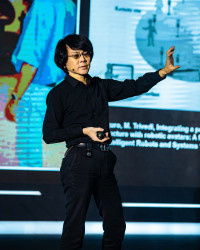Japanese roboticist Hiroshi Ishiguro and his robot twin, Geminoid HI-1, wow DeepFest audience with futurist vision of “human-robot symbiotic society”
The Kingdom of Saudi Arabia enhanced its game-changer status in the global data and artificial intelligence (AI) sectors with the opening instalment of DeepFest – a new co-located event held in partnership with the Saudi Data & Artificial Intelligence Authority (SDAIA) – on the side-lines of LEAP23, the world’s most visionary tech event.
The inaugural DeepFest has gathered drivers of the global AI ecosystem to unveil multi-sector initiatives in a three-day thought-leadership conference with sector-specific tracks, trainings, live-demos, and startup pitches.
RELATED: Star-studded LEAP23 offers $1.54m prize pool in startup pitch challenge and cloud hackathon
Complemented by a dedicated exhibition featuring companies transforming the world we live and work in, the DeepFest conference program – themed AI Beyond Imagination – homes in on AI implementation in areas such as clean tech, the Metaverse, women in technology, and more – including robotics.
Robots and avatars take centre-stage in future vision of human-robot symbiotic society
Amid the assembled pool of change-makers, big tech pioneers, data scientists, innovators, enterprises, academia, startups, and innovative business entrepreneurs, famed roboticist Hiroshi Ishiguro delivered an inspired session titled Avatar and the Future Society.
Ishiguro, the director of the Intelligent Robotics Laboratory – part of the Department of Systems Innovation in the Graduate School of Engineering Science at Japan’s Osaka University – has been pioneering advancement in humanlike robotics since 1997. The 59-year-old has also been creating eerily realistic androids for over 15 years, including Geminoid HI-1 – the roboticist’s own virtual twin, who joined him on stage at DeepFest.
Having spent his career dissecting the nature of what it means to be human, Ishiguro outlined how advances in robotics and avatars are narrowing the separation between human and humanoid.
“By 2050, we want to realise a society in which people are free from the constraints of the body, brain, space, and time. The technology is being developed already; with our automated robotic tech, we can create avatars that anyone can use easily. I believe we can create avatars that will allow anyone – from children to the elderly, and everyone in between – to play an active role in society. With avatars, I believe we can change the world. We can choose to work, study, and socialise with real-life robotic or computer graphic (CG) avatars. Many companies in Japan are already using CG avatars for customer service – not in place of humans, but with humans controlling their own avatars. In Japan, we have an aging population problem, and we need to find solutions that allow people to work – this can be solved by using avatars and advanced robotic technology,” said Ishiguro.
Other sessions in the day one DeepFest agenda included Neural-Symbolic AI Driving Progress Toward Artificial General Intelligence with Dr. Benjamin Goertzel, CEO of the SingulaityNET Foundation; Generative AI Revolution with Leonid Zhukov, Director of Boston Consulting Group’s Global AI Institute; How Technology is Inspiring the Future Workforce with Beverly Rider, CCO of Tonomous and CEO Tonomous VentureStudio, and more.
































